Central Bank Digital Currencies (CBDCs) are digital versions of cash issued and regulated by central banks. They correspond to digital money denominated in the national unit of account and liability of the central bank.
By mid-2022, almost 100 CBDCs were being subject to research or testing. Two had already been launched, one of them in Nigeria (eNaira) and the other in the Bahamas. According to a survey by the BIS (Bank for International Settlements) last year, 90% of central banks there approached were undertaking CBDC analysis or projects in the previous year, with 26% already implementing pilot projects (Kosse and Mattei, 2022).
Potential benefits from CBDCs include the facilitation of financial inclusion, more resilient domestic payments, and enhanced competition. Beyond improving access to money, payment efficiency and lower transaction costs may be attained. On the other hand, some risks and challenges will have to be faced.
As we approach in this chapter, African central banks are part of such a global trend. Most are yet in the beginning (research and analysis), while Nigeria has already issued a retail CBDC, and South Africa and Ghana are implementing pilot projects (wholesale and retail, respectively). Without CBDCs can enhance the public good nature of the monetary system, with the central bank at the core of safe, low-cost, and inclusive payments. Some broad risks and challenges are also highlighted. First, we summarize how a monetary system can be strengthened with digital finance and new private forms of digital money if not being based on cryptocurrencies. Second, we approach the motivations of African central banks for CBDCs. Finally, we call attention to some of the challenges and risks accompanying such a move to CBDCs.















